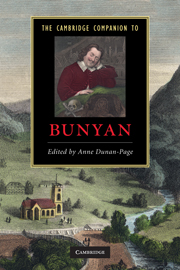Book contents
- Frontmatter
- Introduction
- Part I John Bunyan in his seventeenth-century context
- Part II John Bunyan’s major works
- Part III Readership and reception
- 10 Posthumous Bunyan: early lives and the development of the canon
- 11 The Victorians and Bunyan’s legacy
- 12 Bunyan: colonial, postcolonial
- Guide to further reading
- Index
12 - Bunyan: colonial, postcolonial
from Part III - Readership and reception
Published online by Cambridge University Press: 28 July 2010
- Frontmatter
- Introduction
- Part I John Bunyan in his seventeenth-century context
- Part II John Bunyan’s major works
- Part III Readership and reception
- 10 Posthumous Bunyan: early lives and the development of the canon
- 11 The Victorians and Bunyan’s legacy
- 12 Bunyan: colonial, postcolonial
- Guide to further reading
- Index
Summary
In the wake of Barack Obama's nomination as President Elect of the USA in November 2008, tributes poured in from across the world. One, entitled 'Pilgrim's Progress', came from Tolu Ogunlesi, a Nigerian poet. The poem begins by depicting a cacophonous media spectacle, rather like an electronic Vanity Fair. Journalists and media pundits constitute 'an army of voluble blackberries'. Those of a left-wing persuasion translate 'King into textese'; the right comprises a 'Klan of epithet dealers'. Into this noisy arena walks Obama. He belongs to neither camp and is further set apart from the predominant whiteness of the gathering with its 'star-spangled genes'. The poem continues: “He will not be one of them. Nor one of us. / He will simply be the sepia-toned pilgrim . . . / He himself will be naked / To be clothed by all who see or hear of him.” Obama will belong to none, yet all will claim him. He will be the screen on to which everyone will project their own particular desires. To elucidate this process, the poem introduces the figure of Bunyan's pilgrim, another international icon who has been claimed by a range of different publics. Like Obama, the pilgrim has functioned as an empty cipher which audiences could fill with their own agendas. Readers as diverse as Jamaican Baptists and persecuted Christian converts in Madagascar have claimed the text as their own. The text's episodic structure allows readers to select the bits which serve their purposes while its allegorical architecture permits a wide range of interpretations.
- Type
- Chapter
- Information
- The Cambridge Companion to Bunyan , pp. 162 - 176Publisher: Cambridge University PressPrint publication year: 2010



